In ancient Persia, during the reign of the ruthless and oppressive king Zahhak, there arose a man of humble origins who became a symbol of resistance and courage. His name was Kaveh, a blacksmith whose life changed forever when he dared to challenge the tyranny that engulfed his land. This is the story of Kaveh the Blacksmith, a tale of bravery, defiance, and the fight for justice that has been passed down through generations. Kaveh’s tale is one of triumph against all odds, proving that even the most ordinary among us can rise to become heroes when the time calls for it. In the ancient days, Persia was a land of prosperity and peace. However, this peace was shattered when Zahhak, the son of Merdas, seized power through deception and treachery. Zahhak was not always a tyrant. In his youth, he was a handsome prince with a seemingly kind heart. But this changed when the evil spirit Ahriman appeared before him, disguised as an advisor. Ahriman whispered insidious thoughts into Zahhak’s ears, promising him unimaginable power if he would only allow him to serve. Blinded by ambition, Zahhak accepted the offer, unaware of the darkness that would consume him. As part of his pact with Ahriman, Zahhak murdered his own father and took the throne. Soon after, serpents sprouted from Zahhak's shoulders, horrifying him. In a desperate attempt to rid himself of this curse, he consulted Ahriman, who advised him to feed the serpents the brains of young men daily. Thus began a reign of terror, with Zahhak's soldiers scouring the land to fulfill the gruesome demand. His tyranny knew no bounds, and the people of Persia suffered under the weight of his oppression. Kaveh was an ordinary blacksmith, living in the shadow of the king's palace with his wife and children. He was a man of simple means but had a heart as strong as the steel he forged. One fateful day, Kaveh's life was turned upside down when Zahhak's soldiers arrived at his doorstep. Two of Kaveh’s sons were seized to be taken to the palace, destined to be sacrificed to the monstrous serpents on Zahhak’s shoulders. Kaveh stood helpless as his children were dragged away, rage and sorrow burning within him. Days turned to weeks, and Kaveh lost all hope of ever seeing his sons again. But then, one night, he had a dream. In his vision, the great hero Fereydun appeared, wielding a mighty mace and calling on Kaveh to rise against Zahhak’s tyranny. Awakening with a sense of purpose, Kaveh knew he could no longer remain silent. He was a blacksmith, not a warrior, but he understood the power of resistance. With his heart steeled against fear, Kaveh took the very leather apron he wore at his forge and fashioned it into a banner, a symbol of defiance against the cruel king. The next morning, Kaveh marched to Zahhak's palace, his apron-banner clutched in his hand. As he stood before the gates, he demanded an audience with the king. Surprised by this audacious act, Zahhak allowed him entry, confident that one man could not pose a threat to his rule. In the grand hall of the palace, Kaveh confronted Zahhak. He spoke of his sons, of the suffering of the people, and of the injustice that had befallen the land. With every word, the anger in his heart grew, and the courage in his voice echoed through the chamber. “Enough!” Kaveh shouted. “I will not be silent any longer! You have taken my sons, but you will not take my soul!” He raised his banner high, and the assembled crowd, who had long suffered in silence, began to murmur in agreement. Enraged, Zahhak ordered his guards to seize Kaveh, but before they could reach him, Kaveh tore himself free and stormed out of the palace. He returned to his village, where he began to rally the people. “We will not bow to tyranny any longer!” he declared. “Take up your tools, your hammers, your axes, and your sickles! We will rise as one and reclaim our land!” The news of Kaveh's defiance spread like wildfire across Persia, and soon, villages and towns joined his cause. Farmers, craftsmen, and laborers took up arms, inspired by the courage of a blacksmith who dared to challenge a king. Fereydun, the rightful heir to the throne who had long awaited the moment to strike, joined forces with Kaveh, recognizing him as a symbol of hope and resilience. As the rebellion grew, the people fashioned armor and weapons from whatever they could find, forging them in Kaveh's own forge. He became the heart of the movement, a beacon of hope in the darkest of times. They marched under Kaveh’s banner, a simple leather apron that had become a symbol of freedom, and took back town after town, liberating their brothers and sisters from Zahhak's grasp. Kaveh stood beside Fereydun, his banner fluttering in the wind, as they led their army to Zahhak's palace for the final confrontation. They were tired, battered, but unyielding. They would not rest until Zahhak's reign of terror was ended. Zahhak, desperate to cling to his power, unleashed his forces against the rebels. The battle was fierce and brutal, but Kaveh and his allies fought with the strength of ten men. Kaveh wielded his hammer like a weapon, striking down enemies with the same precision he used in his forge. Fereydun, armed with his mighty mace, fought with a fury that could only be fueled by righteousness. Finally, after hours of fighting, they reached Zahhak’s throne room. There, they confronted the king, who now stood alone, his serpents hissing and writhing with fury. Zahhak attempted to strike Fereydun down, but Kaveh leaped forward, blocking the blow with his hammer. “You will harm no more!” Kaveh roared as Fereydun struck the final blow, knocking Zahhak to the ground. As the tyrant lay defeated, the serpents on his shoulders fell lifeless, their hunger finally sated. With Zahhak defeated, the people of Persia rejoiced. Kaveh's banner was raised high, and Fereydun ascended to the throne, promising to rule with wisdom and compassion. The kingdom, once oppressed, now flourished, and Kaveh became a legend, his story passed down through generations. Kaveh returned to his forge, where he continued to work, but he was no longer just a blacksmith. He was a hero, a symbol of resistance and courage, a man who proved that even the most humble among us can rise to greatness when faced with injustice. Years passed, and the tale of Kaveh the Blacksmith became a part of Persian lore. Children would gather around their elders, listening in awe to the story of the man who stood against a king and brought light back to their land. His banner, the simple leather apron, was enshrined in the palace, a reminder of the power of unity and the strength that lies within each of us. And so, Kaveh's legacy lived on, a testament to the unyielding spirit of those who dare to fight for what is right, even in the face of unimaginable darkness. The story of Kaveh the Blacksmith is more than a tale of heroism; it is a reminder that the power to change the world lies within each of us. His actions, his courage, and his unwavering belief in justice transformed him from a humble blacksmith into a beacon of hope for an entire nation. It is this lesson that has carried Kaveh's story through the ages, inspiring countless others to rise against tyranny and oppression, no matter how insurmountable the odds may seem. Kaveh’s journey was not one of seeking fame or glory. He sought only to protect his family, his people, and his land. In doing so, he became a symbol of hope, a hero whose legacy would inspire generations to come. And as long as there are those who remember his story, Kaveh the Blacksmith will continue to live on, reminding us all that even the most ordinary among us have the power to change the world.The Rise of King Zahhak
Kaveh the Blacksmith
The Call to Arms
The People's Rebellion
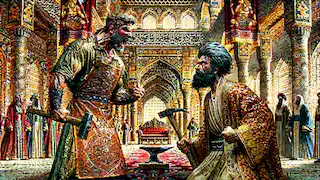
The Fall of Zahhak
The Dawn of a New Era
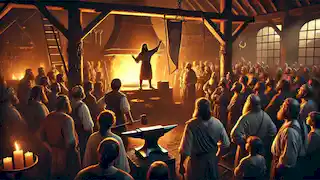
Epilogue
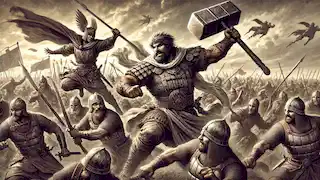
Reflection
Conclusion
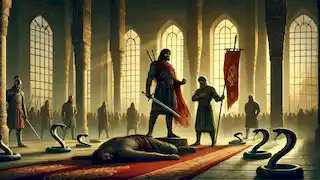
The Tale of Kaveh the Blacksmith
Reading Time: 7 min
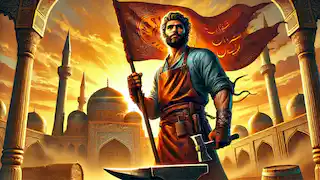
About Story: The Tale of Kaveh the Blacksmith is a Legend Stories from iran set in the Ancient Stories. This Dramatic Stories tale explores themes of Courage Stories and is suitable for All Ages Stories. It offers Cultural Stories insights. A blacksmith's defiance sparks a rebellion against tyranny in ancient Persia.

















